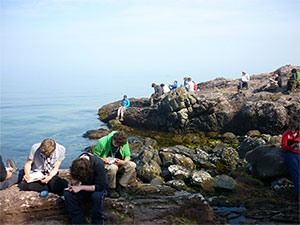Why is fieldwork so important to geologists? - Chae Cruickshank
24 April 2017
At this time of year you may have noticed the return to our countryside of colour, not just migrant birds and crocuses, but flocks of mini buses parked at the side of roads in the Lake District, Wales and the Isle of Arran, disgorging their brightly clad passengers. Why should geology students undertake fieldwork?
At university, the QAA Earth Science benchmarks specifically highlight the role of fieldwork in enabling students to visualise and extrapolate data in three dimensions, and to develop their understanding and application of practical methodologies. In addition, “field-based studies allow students to develop and enhance many of the generic skills (for example, team working, problem solving, self-management and interpersonal relationships) which are of value to the world of work and active citizenship.”
(QAA Earth Sciences, Environmental Sciences and Environmental Studies, October 2014).
Employers also put store in students’ experience of fieldwork, from my 10 years as a commercial geologist the applicants’ experience of fieldwork was an important part in assessing both their knowledge and ability to fit in to our team. “The industry perspective is clear - the skill to visualise, think and sketch models in 3D gained from field work is absolutely invaluable - if you don’t have this then it does not matter how good you are at producing nice attribute images from seismic: if you do not know what you are looking for (i.e. what the geological element/geobody looks like) you cannot find it.”
Ian Sharp (Chief Researcher – Geology at StatoilHydro).
So, most practising geologists have done a lot of fieldwork: an undergraduate on an accredited Geology BSc course is required to do 60 field days, on a joint degree with Geoscience 35 days, MSc courses require 64 and 39 days respectively.

The reformed Geology AS/A Level requires all students to undertake a minimum of 4 days (2 days for AS) fieldwork and recognises that field work can take place in different contexts: virtual fieldwork, local fieldwork outside the classroom and fieldwork on unfamiliar outcrop geology. In a recent survey, we found that 81% of teachers of geology though that fieldwork had an important impact on results and 90% thought it important in students progressing to Earth Science courses at HE. The three most important reasons that teachers highlighted for incorporating fieldwork into their teaching were: to develop the application of practical skills, to enable students to understand the complexity (‘messiness’) of real geology and to encourage accurate observation and description. While teachers recognised the barriers to fieldwork (cost to students, preparation time and cover), most teachers felt that benefits far outweighed costs and once students had experienced fieldwork they were effective in recruiting their peers to geology.
Submit your comments below, and if you would like to get in touch with us then please email us via science@ocr.org.uk or send your tweets to @OCR_Science.
About the author

Chae Cruickshank
Subject Advisor - Geology
Chae joined OCR in April 2014 as a member of the science team and the A level Geology specialist. Chae taught for nine years in both independent and state schools and was then the chief instructor at a field studies centre on the Isle of Arran for seven years. Chae has a wide experience of Earth science including postgraduate research in Svalbard, mapping tunnel valleys and ground water flow in Norfolk and nine years as a senior geophysicist in the Middle East. Before university Chae worked as a care assistant in Inner London and has an abiding interest in inclusion and special needs. Chae enjoys poetry, cookery and conservation work, preferably in remote parts of the Scottish Highlands or Iceland.